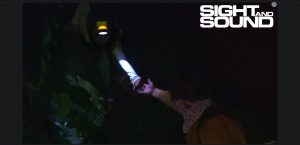Beyond Utopia: Korea opportunities are thin on the ground for this family in flight
Saturday, October 21st, 2023
By Nicolas Rapold from the Sundance Film Festival

Using first-hand accounts, clandestine footage of torture and poverty, and a brutal editing style, Madeleine Gavin’s gripping film charts one family’s narrow escape from the clutches of a dictatorship.
It’s one thing to read about North Korea’s brutal, isolated dictatorship, and quite another to watch the terrifying journeys of those trying to flee its clutches. That’s just what Madeleine Gavin’s overwhelming documentary Beyond Utopia does in showing one family’s nerve-wracking flight from North Korea through China and other countries with the help of South Korean pastor Kim Seungeun, a veteran manager of such efforts. This jam-packed film also fleshes out life and death in North Korea in harrowing detail, with some clandestine glimpses from within the country, and chronicles one more escape – by the young son of a defector-turned-activist in South Korea – through the latter’s desperate phone calls with fixers.
Documentaries about North Korea sometimes fall into simply gawking at the bizarro world of living under its propagandistic totalitarian regime. Gavin’s use of survivors giving first-hand accounts and of (some) secret footage of torture or extreme poverty within the country helps stave off this kind of rubbernecking, though some facts of North Korean existence – such as the mandatory submission of household faeces to the government for use as fertiliser – still feel so extreme as to trigger our sense of the absurd. The film definitely doesn’t shy from the ample suspense in the fugitive family’s escape, as they travel at night through jungles and by boat, stopping to rest in safehouses yet always on guard.
The family’s trip is a profound profile in courage, with both exhaustion and fortitude written on their faces – father, mother, two young daughters, and an unstoppable 80-year-old grandmother. That thread of the film bears comparison to recent documentaries about Syrian refugees, where the risks feel inscribed in the camerawork. (Part of our access appears to come from self-chronicling by the family or the pastor.) The activist coping with her son’s escape from afar is a source of anguish, and the fact that we hear only the voices of fixers, who may or may not be on the level, underlines her horror and helplessness. Beatings, execution and threats to the rest of a defector’s family are the stakes at virtually every turn.
These are hard but necessary stories to hear, and you get the sense that Gavin wanted to include as much as possible. The film’s editorial scheme can feel almost assaultive, allowing little to no breathing room or flow as it cuts among the journeys, talking-head interviews, glimpses of North Korea, and so on. But it all ends with some incredible reflections by the members of the family, now free in South Korea, about the unreality of their decidedly dystopian former home.





